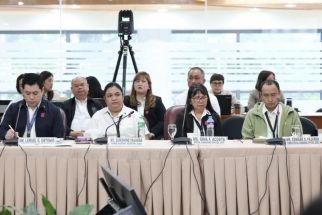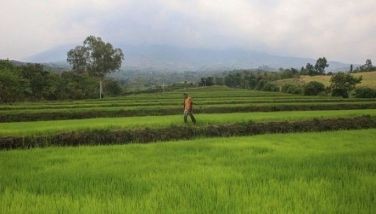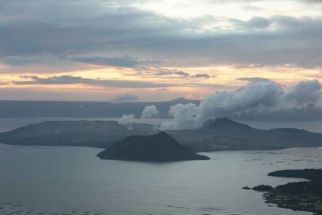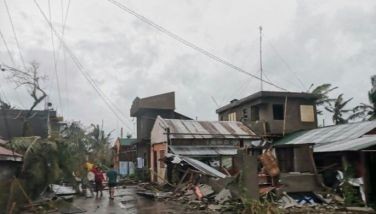Noy to business execs: Philippines still an ideal place to invest
MANILA, Philippines - While there is room for improvement in the administration’s anti-corruption drive, investors should not overlook the fact that the Philippines remains an ideal place to grow business, President Aquino told a gathering of global CEOs yesterday.
The President’s appearance was among the highlights of the 15th annual Forbes Global CEO Conference held in Manila for the first time from Oct. 12 until yesterday.
Part of the event was Aquino’s engaging in “A Meeting of Minds” one-on-one dialogue with Steve Forbes Jr., chairman and editor-in-chief of Forbes Media.
Aquino told business executives they should not lose sight of the achievements of his administration, as well as the country’s strategic location and its young and dynamic population, despite problems facing the country.
He conceded there were provisions in the Constitution that would have to be looked into, particularly those limiting certain areas of professions to natural-born citizens.
“But, again, we’d like to think that we are a progressive people where logic and rationality prevail and this will be assessed more especially by those that come after us. We have about 260 days remaining in office,” Aquino said.
From $1 billion, Aquino said foreign direct investments ballooned to about $6 billion, a 600 percent growth.
“And I think I keep hearing comments from investors, especially foreign ones, who are saying ‘we should have joined you when you started.’ So it’s not too late,” he said.
“There are so many opportunities in this country. We have so many potentials that have yet to be tapped in so many different sectors,” the President said.
The conference is an annual global business event organized by Forbes Magazine. It gathers business magnates, entrepreneurs, CEOs and intellectuals. Some 400 of the world’s top business leaders attended this year’s conference, which focused on the theme of visionary leadership or “how companies can best conceive and articulate a winning vision to drive their businesses forward.”
“Good governance is good economics,” he said.
Aquino said former President and now Pampanga Rep. Gloria Macapagal-Arroyo is in jail on various charges and that the Supreme Court chief justice and the ombudsman she had appointed had been replaced.
“I keep stressing to those agencies that are directly involved in ferreting out all of these wrongdoings that the key to success is not filing cases but actually getting convictions,” he said.
“And I’m convinced that they are exerting everything that is in their power to make all of these who have done wrong by our people to be made to account for their actions,” Aquino said.
On security concerns, the President said local media had the tendency to sensationalize stories.
“We admit, we have problems, but I don’t think our problems are disproportionate to any other country of our size and our particular status,” he stressed.
“Most of the kidnappings happen in… the southern part of the Philippines, where we are in the process of trying to forge a peace agreement with the major secessionist group,” Aquino said, referring to the Moro Islamic Liberation Front. He reiterated his wish for the proposed Bangsamoro Basic Law to be passed.
“The other aspect is we are in the process of modernizing both our armed forces and our police and getting them the equipment, the training and the necessary personnel to effect the security considerations for this country. So, again, it will be wrong to say that there is no crime in the Philippines. But I think our crime situation is being addressed,” Aquino said.
The President said there had been quite a substantial reduction of the so-called index crimes, but that “we are not stopping our efforts to make us as crime-free as possible.”
“But we do have the same threats as anybody else – drug cartels trying to penetrate our country, either to sell to us or as transshipment points; the new white collar crimes of identity theft is also a work in progress in terms of addressing it; and so on and so forth,” Aquino said.
The President also highlighted the strategic location of the Philippines.
Aquino said aside from running after the corrupt, tax and other revenue collections have been improved instead of imposing new taxes – except on sin products.
“This in turn has enabled us to embark on very ambitious programs like, for instance, the growth in spending in infrastructure. We project it will be about five percent of GDP (gross domestic product) by next year. It’s at four percent currently. That has opened up so much to the countryside and delivered a lot of various services to our people,” he said.
“Also, massive investments in the social services, be it education, be it health,” Aquino said.
Inroads to future
Meanwhile, Forbes praised President Aquino for economic and political inroads achieved under his administration.
“Believing in the future that something the rest of the world needs, which is why we hope after you leave office you will come to the US and give us some of that belief in the future,” Forbes told Aquino after he asked him about the things that he could be most proud of after stepping down in 2016.
Aquino said from apathy and hopelessness or “nothing was possible” mindset, the Filipinos’ “new attitude” is “everything seems to be possible.”
“Even those who are outside of the country exhibit that, shall we say, renewed pride. So with that concept, when we started out we said ‘we can now start dreaming again.’ Now, I think that has translated (to) ‘the dreams are more and more becoming realities as the days go by,’” the President said.
“So we think that what we have achieved currently is just a stepping stone towards what can be achieved by the next administration because they will be starting at a better situation than what we had when we started,” he said.
Aquino expressed belief fewer Filipinos were opting to leave when all that he was asked to do in 2009 – the time he was being prodded to run – was to stop the “hemorrhaging” of the nation.
“And I think we have gone beyond stopping the hemorrhaging to actually getting our people really – how shall we say that? – inspired, whereas our primary ambition before we started in office was how to get out of the Philippines,” he said.
When asked about currency stability, the President said he has a very good economic cluster that has so far given him all the right predictions that insulated the country from global turbulence.
“And I think we are very prudent in terms also of borrowing. In the era of very liquid situation, we did not pounce on borrowing from everybody who has a capacity to lend us, but each borrowing really had to have a significant output,” he said.
“We have this investment, are we going to take this particular cost? What is the output that will generate to the common good? And, if that cannot be demonstrated, then we will not undertake this particular loan. I guess I am very conservative in terms of handling the people’s funds,” Aquino said, to which Forbes replied: “That’s why we need you in Washington.”
Forbes said even the Philippine government’s debt had gone down quite dramatically in recent years.
“Again, I think it’s a virtuous cycle: spend on that which really redounds to the common good, produces the expected common good, increases the revenues the government can take, diminishes the need to borrow to balance the budget,” Aquino said.
Forbes told Aquino that in recent years, there had been significant spike in growth rates in the Philippines that the world has not seen in decades.
“And you’ve become a regional leader, global leader, five to six percent growth rates, sometimes averaging seven percent,” Forbes said.
- Latest
- Trending

































